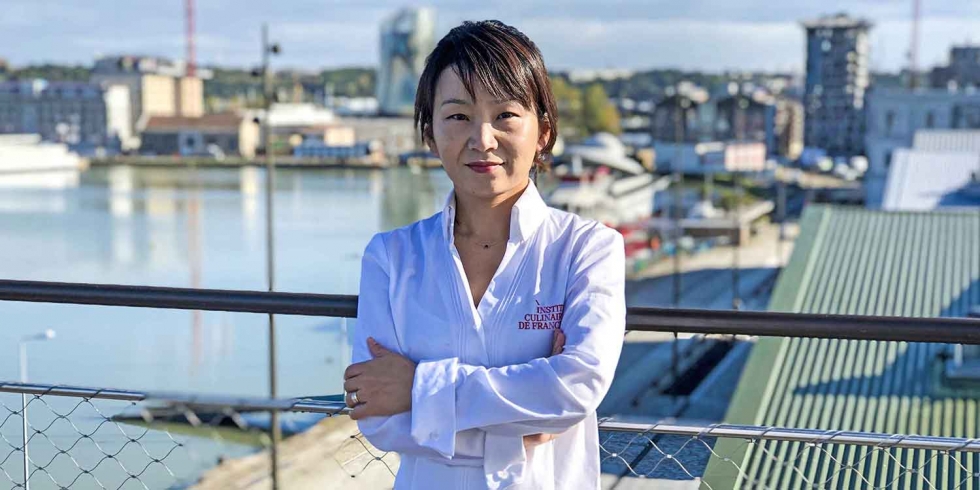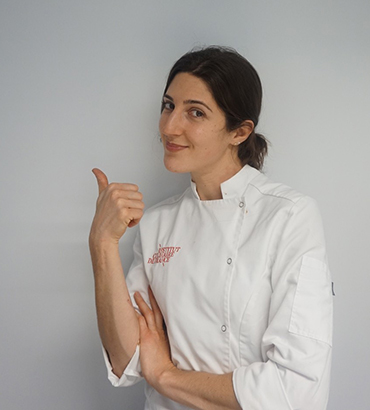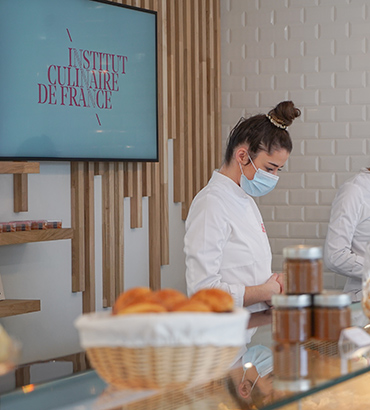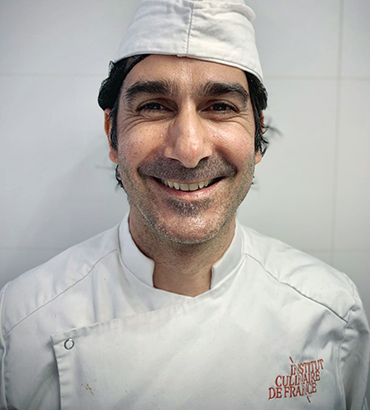From France to the United States, China, Korea and Saudi Arabia—your pastry has travelled the world. How did you develop a taste for the art of desserts?
I come from South Korea and it was there that I began to study fine arts, specialising in sculpture. But it was very difficult to find a job in this field, so it didn't take long for me to turn to baking, in which I found the artistic and visual aspect that I liked in sculpture. This experience has since been incredibly useful to me.
So you changed directly to studying baking?
Yes. I came to France, an emblematic country in terms of pastry, to take my CAP professional diploma. It was there that I met my husband, who was also studying for a CAP in baking. I then worked in Brittany and Aix-en-Provence, with the goal of going to work abroad, but I needed a master's certificate. So my husband and I took the diploma and, immediately afterwards, our school offered us the opportunity to go and work in Las Vegas, at Joël Robuchon's restaurant and we jumped at the chance! I worked there as a pastry sous-chef for two years—it was an exceptional experience. We then returned to France to work for eight months in a Michelin-starred restaurant in Cassis, before leaving for Saudi Arabia, to set up a bakery, pastry, catering and chocolate school project. We stayed there for about three years.
The transmission of knowledge is what I love most in pastry.
Then you turned your hand to teaching...
Absolutely. When we returned to France, we were fortunate to be hired at the École Nationale Supérieure de Pâtisserie (ENSP) as instructors. We met a lot of high-level professionals who really helped me to participate in different competitions, like the pastry championships and the Meilleurs Ouvriers de France (MOF) competition. After that, we went to work abroad (again!): in Seoul, in a big bakery company, then in China. But when I was offered the opportunity to join the Institut Culinaire de France, I didn’t hesitate because the transmission of knowledge is what I love most in pastry.
In recent years, we have seen a lot of enthusiasm among young people for baking. What do you think?
It's true, baking is growing in popularity, and I think that's mainly thanks to social media. When I started in the business, 18 years ago, we did not have this image of pastry making—it remained very traditional. Then some stars started showing their work through the media and social media, and baking has grown enormously. It also changed the way people look at baking—it’s more attractive, and that's great. But some young people, through this image, tend to see only the easy and beautiful aspect of the profession, to the detriment of the daily reality, which is different to what you see on TV or the Internet. With this new image, young people tend to want to skip stages or learn everything by themselves... Baking is a hard job to do every day and it takes a strong mindset to do it.
At school, you don’t just learn techniques; it is also about attitude, adapting behaviours, the reactions you need to have in emergencies and teamwork, too. These are the basics of the profession.
Is that why you feel it’s important to train?
For me, real training is essential. You have to work at school with a real professional to learn from A to Z. Because when you train at a school, you don’t just learn techniques; it is also about attitude, adapting behaviours, the reactions you need to have in emergencies and teamwork, too. These are the basics of the profession, reflexes that we retain throughout our lives, and which must be instilled in us by real professionals.
What is important to you as a trainer?
As a trainer, I see that many young people tend to get discouraged or give up quickly. But personally, I would very much like my students to persevere, despite the difficulties of the profession. My goal is not only to give them the techniques, but also to mentally prepare them for the reality of the profession so that they can withstand the difficult moments they will encounter on a daily basis, and manage to exercise what is one of the most beautiful jobs in the world. We want to support them so that they become real professionals and keep a link with them in the future.



